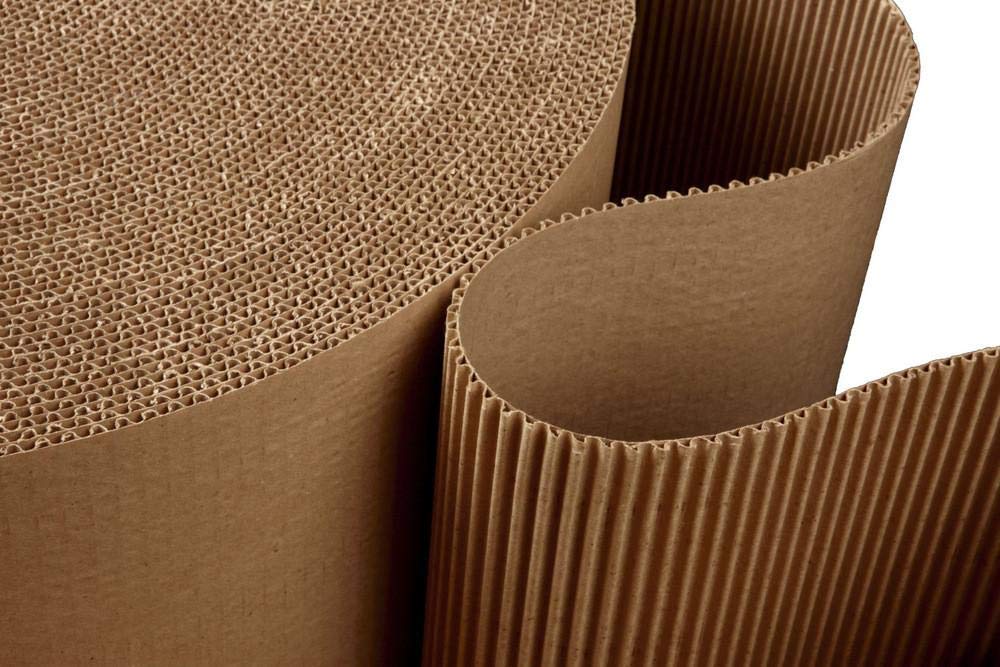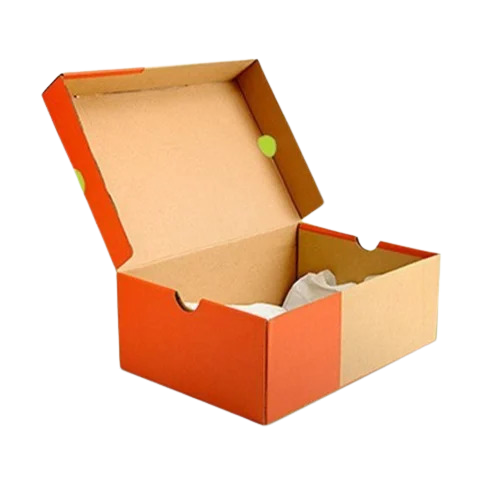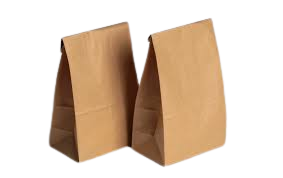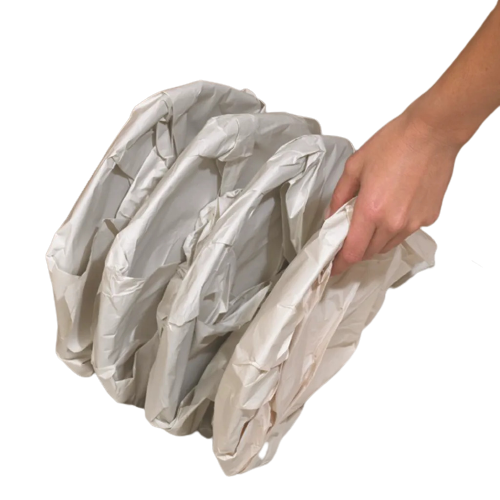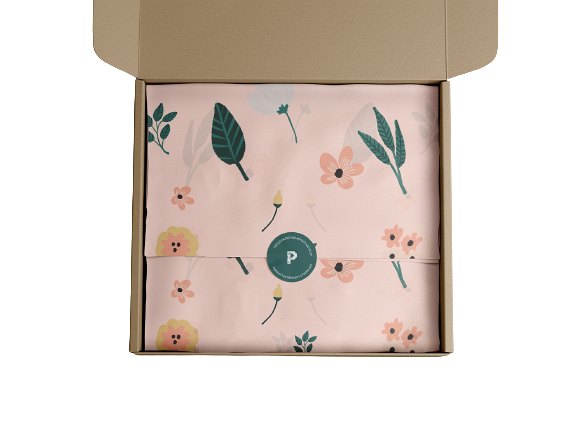Cork Packaging
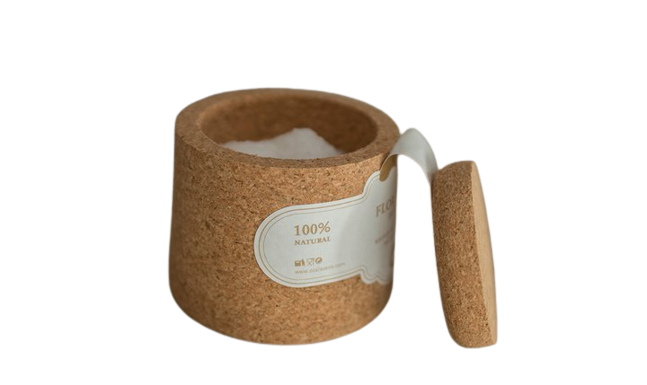
Cork Packaging
Cork-based packaging is sustainable and renewable, derived from the bark of cork oak trees. It provides natural cushioning, protection, and is widely used for applications such as wine bottle stoppers and protective packaging inserts.
 Carbon Footprint: 850 to 1,400 kg CO2e per tonne*
Carbon Footprint: 850 to 1,400 kg CO2e per tonne*
 Time to decompose : a few weeks in facility
Time to decompose : a few weeks in facility
 Recyclability : 2 to 3 times
Recyclability : 2 to 3 times
 Price Range : $ 0.20 to 0.40*
Price Range : $ 0.20 to 0.40*
Key features
| Features | Description |
|---|---|
| Lightweight | Cork is a lightweight material, making it ideal for reducing overall package weight and shipping costs. |
| ShockAbsorbent | Cork's natural elasticity and cellular structure provide excellent shock absorption, protecting fragile items during transport. |
| Insulation | Cork has natural insulating properties, offering thermal and acoustic insulation to protect sensitive products from temperature variations and external noise. |
| Impermeability | Cork is impermeable to liquids and gases, providing a barrier that prevents moisture, air, and contaminants from affecting the packaged items. |
| Renewable | Cork is harvested from the bark of cork oak trees, which regenerate their bark, making it a renewable and environmentally friendly material. |
| Biodegradable | Cork is biodegradable and can naturally decompose without leaving harmful residues, contributing to a more sustainable waste management cycle. |
| Recyclable | Cork-based packaging can be recycled and repurposed into other cork products, reducing waste and extending its lifecycle. |
| Versatility | Cork can be molded into various shapes and sizes, accommodating different product dimensions and packaging requirements. |
| Aesthetics | Cork has a unique and natural appearance that adds an element of sophistication and eco-friendliness to the packaging. |
| Branding | Cork's surface can be customized with branding or design elements, allowing for unique and visually appealing packaging solutions. |
Specification
- Thickness : Cork-based packaging can come in various thicknesses, ranging from a few millimeters to several centimeters, depending on the desired level of protection and insulation.
- Density : Cork can have different densities, which affects its weight, compressibility, and shock-absorbing capabilities. The density can be specified based on the specific packaging needs.
- Size and Shape : Cork-based packaging can be manufactured in different sizes and shapes, including sheets, rolls, blocks, or custom-molded forms, to accommodate various product dimensions and packaging configurations.
- Moisture Resistance : Cork is naturally resistant to moisture, making it suitable for protecting products that may be sensitive to humidity or moisture damage.
- Fire Resistance : Cork has inherent fire-retardant properties, making it a suitable choice for packaging applications that require fire resistance.
- Compatibility : Cork-based packaging is compatible with various packaging materials, including cardboard, plastic, or metal, allowing for effective integration and secure packaging solutions.
- Customization : Cork-based packaging can be customized with branding, logos, or patterns through printing or engraving, enhancing the visual appeal and brand recognition.
- Sustainability Certifications : Some cork-based packaging may carry certifications, such as Forest Stewardship Council (FSC) certification, indicating that the cork material is sourced from responsibly managed forests.
- Compliance with Regulations : Cork-based packaging can be designed to meet specific regulations and standards, such as those related to food safety or product protection during transportation.
- Environmental Impact : Cork-based packaging is known for its low environmental impact, as cork oak trees are not cut down during harvest, and the trees continue to grow and contribute to the ecosystem.
Related Products
FAQ's
- Q1: What is cork-based packaging?
- A1: Cork-based packaging refers to packaging materials or products made from cork, which is harvested from the bark of cork oak trees.
- Q2: Is cork-based packaging environmentally friendly?
- A2: Yes, cork-based packaging is considered environmentally friendly. Cork is a sustainable and renewable material as the cork oak trees regenerate their bark, and it has a low carbon footprint. It is also biodegradable and recyclable.
- Q3: What are the advantages of using cork-based packaging?
- A3: Cork-based packaging offers several advantages, including lightweight construction, shock absorption, insulation, impermeability to liquids and gases, and natural fire resistance. It is also aesthetically appealing and can be branded or customized.
- Q4: What types of products can be packaged with cork-based packaging?
- A4: Cork-based packaging can be used for a wide range of products, including glass bottles, delicate items, electronics, cosmetics, wine, and food products.
- Q5: Is cork-based packaging moisture-resistant?
- A5: Yes, cork has natural moisture resistance, making it suitable for protecting products that may be sensitive to humidity or moisture damage.
- Q6: Can cork-based packaging be recycled?
- A6: Yes, cork-based packaging can be recycled. It can be repurposed into other cork products or processed into granules for various applications.
- Q7: Is cork-based packaging suitable for shipping fragile items?
- A7: Yes, cork-based packaging is known for its shock-absorbing properties, making it an ideal choice for protecting fragile items during shipping and handling.
- Q8: How does cork-based packaging compare to other packaging materials?
- A8: Cork-based packaging offers unique properties not found in many other materials. It combines sustainability, insulation, shock absorption, and impermeability, making it an attractive alternative to materials like plastic or foam.
- Q9: Can cork-based packaging be customized to fit specific products?
- A9: Yes, cork-based packaging can be customized in terms of size, shape, and branding. It can be tailored to fit specific product dimensions and design requirements.
- Q10: Where can I find cork-based packaging?
- A10: Cork-based packaging can be found through various packaging suppliers, eco-friendly packaging companies, or cork product manufacturers. It is advisable to research and connect with reputable suppliers to source high-quality cork-based packaging solutions.


